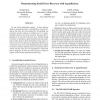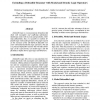39 search results - page 2 / 8 » The practical advantage of surprise-based agents |
AOSE
2001
Springer
13 years 10 months ago
2001
Springer
In this paper, I will demonstrate how the Unified Modeling Language (UML) can be used to describe agent interaction protocols. The approach that is presented in this paper does no...
IAT
2005
IEEE
13 years 11 months ago
2005
IEEE
Multiagent Bayesian networks (MABNs) are a powerful new framework for uncertainty management in a distributed environment. In a MABN, a collective joint probability distribution i...
ATAL
2004
Springer
13 years 10 months ago
2004
Springer
In real world applications, agents - be they software agents or autonomous robots - inevitably face erroneous situations that have not been planned for. Re-planning can sometimes ...
FLAIRS
2001
13 years 6 months ago
2001
Mixed-initiative learning integrates complementary human and automated reasoning, taking advantage of their respective reasoning styles and computational strengths in order to sol...
IAT
2008
IEEE
13 years 12 months ago
2008
IEEE
Defeasible logic is a non-monotonic formalism that deals with incomplete and conflicting information. Modal logic deals with necessity and possibility, exhibiting defeasibility; t...


